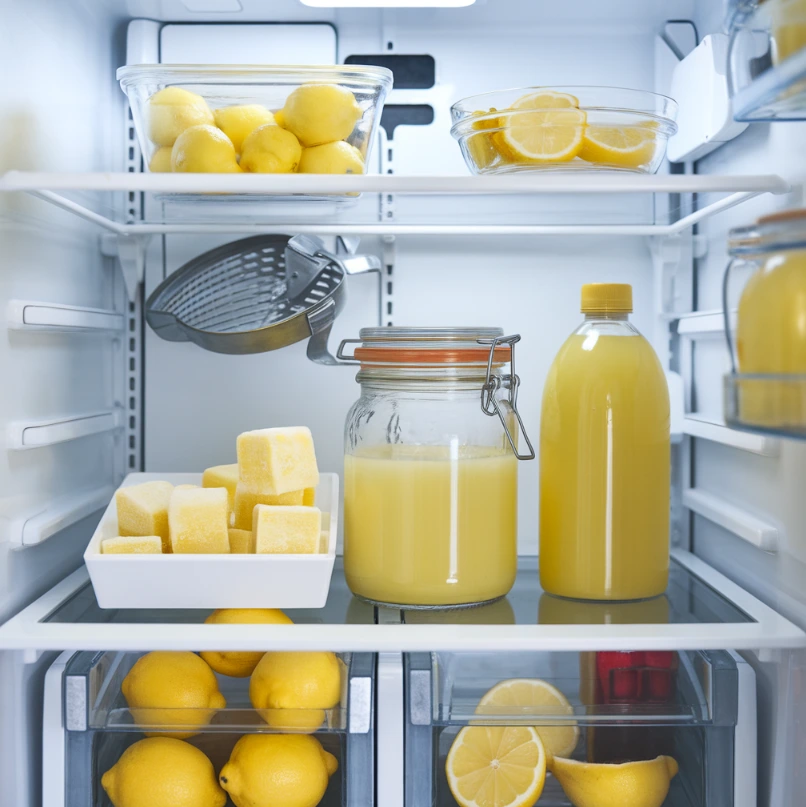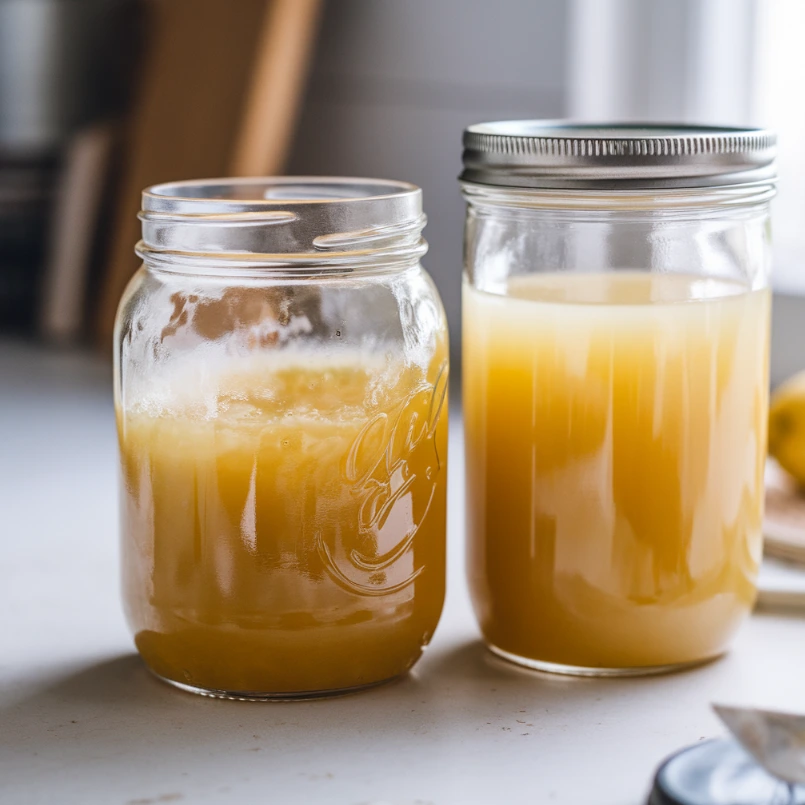Lemon juice, with its tangy and refreshing flavor, is a staple in many kitchens around the world. Its versatility makes it a favorite ingredient for enhancing dishes, beverages, and even household cleaning solutions. However, you might wonder, can lemon juice expire? The answer is yes, and understanding how to properly store and handle lemon juice, whether freshly squeezed or bottled, is essential to preserving its quality and ensuring safe usage.
Freshly squeezed lemon juice, being free of preservatives, is particularly delicate and requires prompt storage to prevent spoilage. Bottled lemon juice, on the other hand, benefits from preservatives but still demands care to maintain its usability. Proper storage not only prevents waste but also ensures you can continue to enjoy its flavor and benefits for as long as possible.
This guide will walk you through the shelf life of lemon juice, offering practical tips for extending its usability and recognizing signs of spoilage. In addition, you’ll discover creative ways to repurpose lemon juice that’s nearing its expiration date, allowing you to make the most of every drop while minimizing waste. By understanding these key aspects, you can keep your lemon juice fresh, flavorful, and ready to enhance your cooking, beverages, or even cleaning routines.
How Long Does Lemon Juice Last?
The shelf life of lemon juice depends significantly on how it is stored and whether it is fresh or bottled. Understanding these differences can help you maximize its longevity and prevent waste. For instance, proper storage ensures that lemon juice remains safe and effective for cooking, beverages, and even cleaning purposes.
Fresh Lemon Juice
Freshly squeezed lemon juice is completely natural, containing no preservatives, which makes it highly perishable. If left at room temperature, it can spoil within hours. However, when stored correctly, its usability can be extended:
- Refrigerated: Fresh lemon juice lasts only 2–3 days in the refrigerator. Always store it in an airtight container to minimize exposure to air, which can lead to oxidation and spoilage.
- Frozen: To extend its shelf life, freeze the juice in ice cube trays. These frozen portions can last up to 3 months and are convenient for recipes or drinks. In addition, freezing preserves the juice’s flavor and nutritional content.
Bottled Lemon Juice
Store-bought lemon juice, thanks to added preservatives, has a much longer shelf life compared to fresh juice. Moreover, it is designed to remain stable for extended periods if stored under the right conditions:
- Unopened: When kept in a cool, dark place away from direct sunlight, unopened bottles can last 6–12 months beyond the printed expiration date.
- Opened: After opening, store the bottle in the refrigerator and ensure the cap is sealed tightly. Under these conditions, bottled lemon juice can stay fresh for 1–2 months.
Additional Tips
Can lemon juice expire earlier than expected? Yes, improper storage can cause spoilage, even before the estimated shelf life. Always check for signs of spoilage, such as cloudiness, a sour smell, or an unusual taste. By understanding the storage needs of both fresh and bottled lemon juice, you can ensure it stays fresh and ready to use whenever needed. Proper storage not only prevents waste but also maintains the quality of this versatile kitchen staple.
Recognizing Spoiled Lemon Juice
Not all lemon juice is created equal, and knowing when it has gone bad can save you from culinary mishaps. For example:
- Cloudy Appearance: Fresh lemon juice is clear; any cloudiness might indicate spoilage.
- Unpleasant Smell: A fermented or sour odor is a warning sign.
- Odd Taste: Spoiled juice often tastes bitter or overly acidic.
Storing Lemon Juice for Freshness

Proper storage is key to ensuring that your lemon juice, whether fresh or bottled, remains flavorful and safe to use. Can lemon juice expire if stored improperly? Yes, it can, but following these best practices can help extend its shelf life and maximize its usability.
Best Practices for Fresh Juice
Freshly squeezed lemon juice, being preservative-free, is particularly susceptible to spoilage. To keep it fresh:
- Use Airtight Containers: Immediately pour freshly squeezed lemon juice into an airtight container and refrigerate it. This prevents exposure to air, which can cause oxidation and lead to spoilage.
- Freeze in Small Portions: To extend its usability, freeze fresh juice in ice cube trays. These portioned cubes are convenient for recipes, drinks, or marinades. Freezing also helps maintain its nutrients and taste for up to three months.
Tips for Bottled Juice
Bottled lemon juice is more stable due to preservatives, but it still requires careful storage:
- Cool and Dark Storage: Keep unopened bottles in a cool, dark place, such as a pantry, to prevent exposure to heat or sunlight, which can degrade the juice.
- Seal Tightly After Opening: Once opened, always tightly seal the bottle and refrigerate it. This minimizes exposure to air and contaminants, ensuring the juice remains fresh for longer periods.
Additional Advice
Labeling containers with the date of storage or freezing can help you keep track of freshness. Always inspect your lemon juice for signs of spoilage, such as changes in color, odor, or taste, before using it.
By implementing these storage tips, you can enjoy lemon juice without worrying about waste or spoilage. For more information and creative ideas, visit How to Keep Lemon Juice Fresh. Proper storage not only enhances convenience but also ensures your lemon juice stays ready to brighten your recipes and household tasks.
Innovative Ways to Use Lemon Juice Before It Expires

Lemon juice nearing its expiration date doesn’t have to be wasted. Instead, you can explore creative and practical ways to repurpose it, ensuring no drop goes unused. Can lemon juice expire if left unused for too long? Absolutely, but before that happens, consider these options:
- Homemade Popsicles: Mix lemon juice with water, a touch of sugar, or even fresh fruit to make refreshing popsicles. These treats are a delightful way to use up lemon juice before it expires.
- Natural Cleaner: Lemon juice is an effective natural cleaning agent. Use it to remove stubborn stains, freshen cutting boards, or deodorize garbage disposals. Its acidic properties make it ideal for tackling household grime and leaving surfaces clean and fragrant.
- Cooking Enhancer: Incorporate lemon juice into marinades, salad dressings, or baked goods. Its tangy flavor enhances dishes and provides a natural tenderizer for meats, making it a valuable ingredient in various recipes.
In addition, freezing leftover lemon juice in ice cube trays offers a simple way to preserve it for future use. These cubes can be added to water, tea, or cocktails for a burst of citrus flavor.
By repurposing lemon juice creatively, you can prevent waste and maximize its potential. For even more ideas, visit Creative Lemon Juice Uses. These tips ensure you get the most out of this versatile ingredient before it expires.s help you make the most of this versatile ingredient while minimizing waste.
Health Risks of Expired Lemon Juice

Using expired or spoiled lemon juice poses risks beyond just altering the flavor of your dishes—it can directly impact your health. For example:
- Digestive Problems: Spoiled lemon juice often contains harmful bacteria or mold that can irritate your digestive system. Consuming it may lead to symptoms such as nausea, vomiting, abdominal cramps, or diarrhea.
- Food Poisoning: If spoiled juice contains high levels of microorganisms, including mold or harmful bacteria like salmonella, it can result in foodborne illnesses. Symptoms of food poisoning range from severe stomach pain to fever and dehydration, especially in vulnerable groups such as children, the elderly, or those with weakened immune systems.
In addition, prolonged exposure to spoiled lemon juice or neglecting proper storage practices increases the risk of contamination. Always check for signs of spoilage, such as changes in smell, appearance, or taste, before using lemon juice to ensure the safety of your meals. By doing so, you can avoid unnecessary health risks and enjoy the benefits of this versatile ingredient without worry.
Frequently Asked Questions
Can Lemon Juice Go Bad?
Yes, lemon juice can go bad, particularly when improper storage allows spoilage to occur. Freshly squeezed lemon juice, which is natural and free of preservatives, spoils more quickly than bottled varieties. Can lemon juice expire faster if exposed to air or left at room temperature? Absolutely. For example, fresh juice deteriorates quickly without refrigeration. To preserve its quality, refrigerate freshly squeezed lemon juice immediately after squeezing to slow the growth of bacteria and mold.
In addition, improper sealing and exposure to warm or humid environments accelerate spoilage. These conditions cause the juice to develop a sour odor, cloudiness, or visible mold, all of which indicate it is no longer safe to use.
Bottled lemon juice, on the other hand, remains more stable because preservatives extend its shelf life. However, can lemon juice expire in the bottle after opening? Yes, exposure to air and inconsistent refrigeration degrade bottled juice over time. You may notice a fermented smell, a change in texture, or an unpleasant taste if spoilage occurs.
As a result, you should follow proper storage practices for both fresh and bottled lemon juice. Use airtight containers, refrigerate fresh juice, and store unopened bottles in a cool, dark place to prevent spoilage. By taking these steps, you ensure your lemon juice stays safe, flavorful, and ready to enhance your recipes.
How Long Can Lemon Juice Last?
Freshly squeezed lemon juice, with its natural and preservative-free composition, has a relatively short lifespan, lasting only 2–3 days when properly refrigerated. Its freshness can be extended significantly by freezing, which preserves the juice for up to three months. For instance, freezing lemon juice in ice cube trays allows for convenient, portion-sized servings that can be used as needed in recipes or beverages. In addition, freezing helps retain the flavor and nutritional benefits of fresh lemon juice over a longer period.
Bottled lemon juice, on the other hand, has a much longer shelf life, often lasting between 6–12 months if unopened and stored in a cool, dark place away from direct sunlight. This stability is due to the added preservatives that help maintain its quality over time. Once the bottle is opened, however, it should be tightly sealed and refrigerated to remain safe for use. As a result, opened bottled lemon juice typically stays fresh for 1–2 months when stored correctly.
In short, understanding the varying storage requirements and lifespans of fresh and bottled lemon juice ensures you can enjoy its versatility without worry. Proper storage practices, like refrigeration and freezing, not only prevent waste but also help you make the most of this essential kitchen ingredient. Whether you’re using it for cooking, beverages, or cleaning, following these guidelines ensures that your lemon juice remains fresh and ready to use.
How long can lemon juice last?
Freshly squeezed lemon juice has a short lifespan, lasting only 2–3 days when refrigerated. However, freezing it can extend its usability for up to three months. Bottled lemon juice, similarly, has a much longer shelf life, often lasting 6–12 months if unopened and stored in a cool, dark place. Once opened, it can remain good for 1–2 months in the refrigerator. In short, understanding the storage needs of lemon juice ensures it stays fresh and safe for as long as possible.
Expanded Conclusion
In conclusion, understanding the shelf life and storage needs of lemon juice ensures you maximize its value while avoiding spoilage. Proper knowledge about how to store and use lemon juice, whether freshly squeezed or bottled, can save you time, money, and effort in the kitchen. Can lemon juice expire? Absolutely, but by recognizing the signs of spoilage and following proper storage practices, you can extend its usability and keep your recipes fresh, flavorful, and safe.
Finally, when looking for inspiration on incorporating lemon juice into your cooking or finding creative ways to use it, explore trusted sources like Tasty, AllRecipes, or Delish for exciting ideas. By doing so, you can make the most of every drop of this versatile ingredient.

